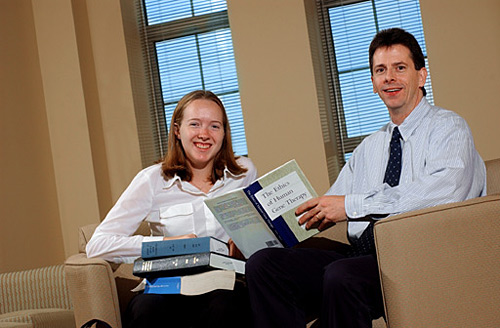John Shaw, associate professor and assistant head of psychology, will give a talk titled “Do You Want to Know the Future? Making Decisions About Genetic Testing” tonight in the auditorium of Oechsle Hall.
The talk was rescheduled from March 6 due to inclement weather.
Free and open to the public, the speech is the spring 2003 Thomas Roy and Lura Forrest Jones Faculty Lecture, given each semester by a professor recognized for excellence in teaching and scholarship.
“As our knowledge about the human genome advances, tests that can identify genetic markers for inherited diseases are rapidly becoming available,” says Shaw. “What do people think about these new genetic tests? Who will want to be tested? This talk will present the results of two recent studies that address these important questions.”
In the first study, 226 randomly selected members of the public completed a mail questionnaire assessing their attitudes toward genetic testing for disease susceptibility. Kelly Egan ’03 (Vernon, N.J.) worked with Shaw to design an experiment for the second study, which used a sample of 154 Lafayette students (see related story). The study examined how some situational, personality, and attitudinal factors may influence someone’s decision on whether to engage in genetic testing.
“The results of these two studies have implications for psychologists, genetic scientists, bio-ethicists, and legal scholars who are grappling with the many issues related to genetic testing for inherited diseases,” says Shaw.
A psychology major, Egan is collaborating with Shaw through Lafayette’s EXCEL Scholars program, in which students work closely with faculty on research while earning a stipend.
“Kelly has been a true partner in our research,” says Shaw. “we plan to submit a manuscript for publication this spring. Kelly has assisted in every phase of the research, and her insights have contributed immensely to the success of our project.”
“I have really been enjoying doing work in this area of psychology,” says Egan. “This opportunity is allowing me to become knowledgeable about an area with which I have not had much prior experience.”
Shaw has published his research in numerous publications, including articles in five different academic journals and a book chapter in the past two years. A former criminal defense attorney and prosecutor for nine years, Shaw has handled several thousand criminal cases and over 100 jury trials, including numerous serious felonies such as rape and murder.
The professor draws on this experience in both his teaching and research. He has mentored Lafayette students who have presented their undergraduate research in academic journals and at conferences.
Last semester, Shaw guided Marquis Scholar Omoniyi Adekanmbi ’04 (New Carrollton, Md.) as she explored the gap in test scores between black and white students in an independent study (see related story. “Dr. Shaw was very helpful,” says Adekanmbi, a psychology major and Africana Studies minor. “He offered some great insight into my understanding of problems in minority education, and had helpful suggestions on where to go with this research in the future.”
A social psychologist, Shaw’s primary research interests include eyewitness memory, eyewitness confidence, and attitudes about genetic testing. He holds a Ph.D. from University of California, Los Angeles, and a J.D. from Stanford Law School.

Kelly Egan ’03 and John S. Shaw, associate professor of psychology, review research project on genetics.
